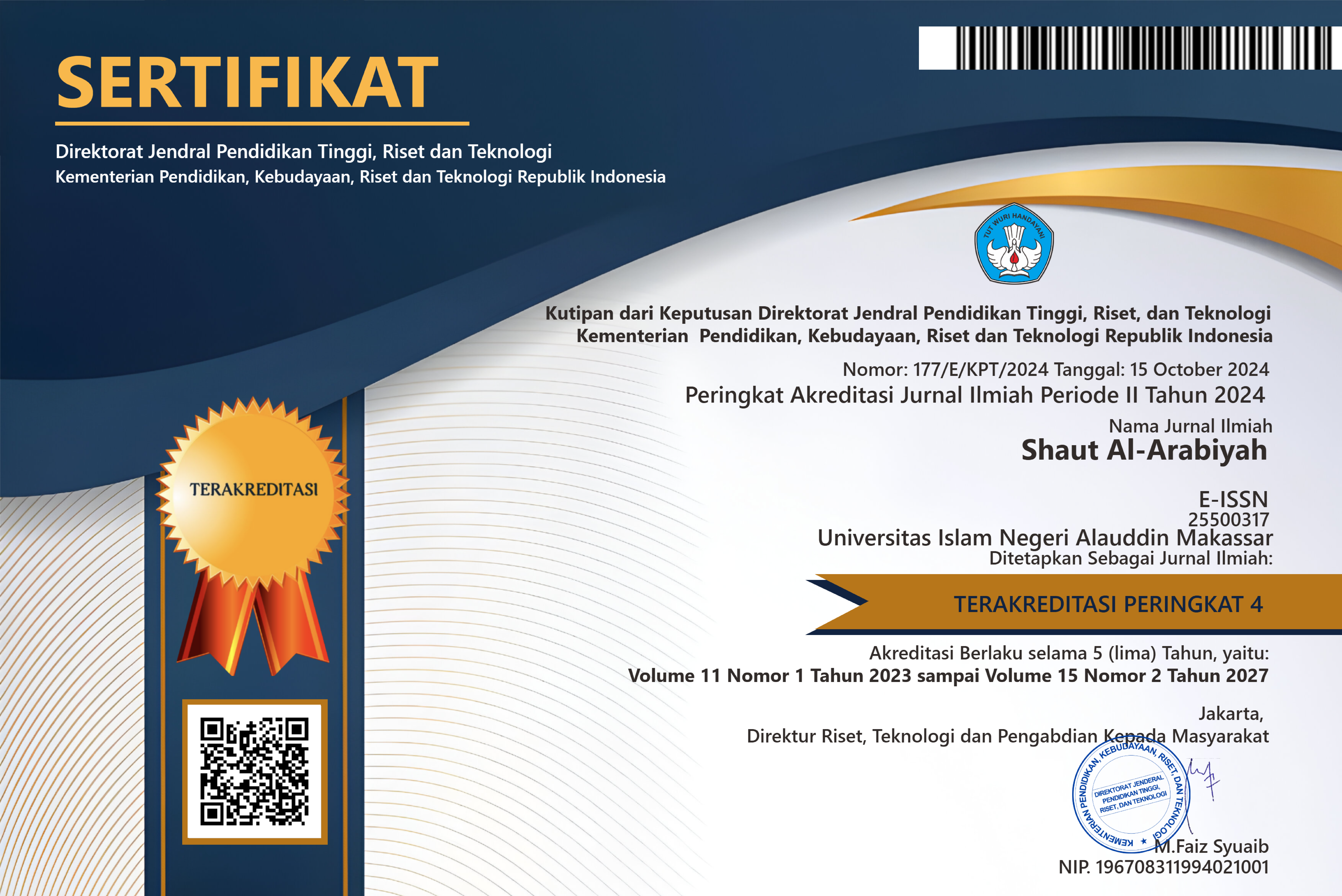Korelasi Penguasaan Kosakata Arab dan Motivasi Belajar Terhadap Prestasi Menghafal Al-Qur’an Santri kelas VIII Mts Darul Qur’an Medan
DOI:
https://doi.org/10.24252/saa.v13i1.49054Keywords:
Kosakata Arab; Motivasi Belajar; Prestasi Menghafal Al-Qur’anAbstract
The purpose of this study is to measure the relationship between vocabulary mastery and learning motivation on the achievement of memorizing the Quran. This study uses a Quantitative approach with a correlational type of research. The population in this study were all 8th grade students of MTS Darul Quran Medan, totaling 20 people. The data collection technique used in this study is a questionnaire. The data that has been collected is then analyzed by Pearson validity test, reliability test, Multiple Linear Regression analysis through the SPSS version 25 statistical program. The results showed that there is a significant relationship between mastery of Arabic vocabulary and learning motivation on the achievement of memorizing the Quran, so it can be concluded that there is a strong and positive relationship between mastery of Arabic vocabulary and learning motivation on the achievement of memorizing the Quran. Evidenced by the value of the hypothesis test results which is 0.001, which is smaller than 0.05 and the R square value is 78.4%. Thus, the results of this study confirm the importance of mastery of Arabic vocabulary and learning motivation in improving the achievement of memorizing the Al-Qur’an, and these two factors are some of the factors that must be prioritized in memorizing the Al-Qur’an.
References
Apnilelawati, Nur. “Motivasi dalam Pendidikan Al-qur'an dan Hadits.” Prosiding Universitas Dharmawangsa 2 (2022): 35–44.
Hakim, Abdul, and Ubaidillah. “Pengaruh Penguasaan Kosa Kata Bahasa Arab Dalam Kemampuan Menghafal Al Qur`An Siswa Sekolah Menengah Pertama Islam Terpadu Al Qur`An Bina Insan Kragilan.” Proceeding of Annual International Conference on Islamic Education and Language (AICIEL), 2023, 1189–1206.
Hakim, Ayatullah Muhammad Baqir. Ulumul Quran. Nur alhuda, 2012.
Husna, Asmaul, Rafiatul Hasanah, and Puspo Nugroho. “Efektivitas Program Tahfidz Al-Qur’an Dalam Membentuk Karakter Siswa.” Jurnal Isema: Islamic Educational Management 6, no. 1 (2021): 47–54.
Jaafar, Nuraznan bin, Mohd Zahimie bin Dzahid, Noor Adawiyah binti Ahmad Radzi, and Akmarina binti Mohd Salwai. “Hubungan Antara Tahap Penguasaan Asas Kosa Kata Arab Dan Tatabahasa Arab Dalam Kalangan Pelajar Madrasah Tahfiz Sekitar Melaka.” Jurnal Kesidang 4, no. 1 (November 15, 2019): 53–62.
Luthfia, Nisa. “Pengaruh Motivasi Terhadap Hasil Belajar Tahfizh Al-Qura’an Pondok Tahfizh Hasanah Talang Babungo,” n.d.
Nurfadilah, Nurfadilah, Abd Aziz, and Muhammad Hifdzil Islam. “Implementasi Metode One Day One Ayat Dalam Meningkatkan Kemampuan Menghafal Al-Qur’an Di Pondok Pesantren.” Jurnal Pendidikan Dan Konseling (JPDK) 4, no. 3 (2022): 1271–81.
Ovan, and Andika Saputra. CAMI: Aplikasi Uji Validitas dan Reliabilitas Instrumen Penelitian Berbasis Web. Yayasan Ahmar Cendekia Indonesia, 2020.
Setiawan, Nugroho Arief. “Pengaruh Pelatihan Penetapan Tujuan (Goal Setting) Untuk Meningkatkan Motivasi Belajar Agama Islam Pada Mahasiswa.” Al-Adyan: Jurnal Studi Lintas Agama 12, no. 1 (August 25, 2017): 31–51. https://doi.org/10.24042/ajsla.v12i1.1443.
Sugiono, Noerdjanah, and Afrianti Wahyu. “Uji Validitas Dan Reliabilitas Alat Ukur SG Posture Evaluation.” Jurnal Keterapian Fisik 5, no. 1 (May 4, 2020): 55–61. https://doi.org/10.37341/jkf.v5i1.167.
Suharsono, Yudi. “Validitas Dan Reliabilitas Skala Self-Efficacy.” Jurnal Ilmiah Psikologi Terapan 2, no. 1 (2014): 144–51.
Downloads
Published
How to Cite
Issue
Section
License
Copyright (c) 2025 Rahmadani, Munirul Abidin

This work is licensed under a Creative Commons Attribution-NonCommercial-ShareAlike 4.0 International License.
















